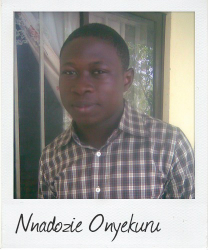“The legendary Chinua Achebe – a gift to the world”
April 26 The late Chinua Achebe was a writer who broke ground in Africa and sparked conversations around the world, writes Nnadozie Onyekuru, 24, a Commonwealth Correspondent from Maiduguri in Nigeria, but he was also a model of humility.
The late Chinua Achebe was a writer who broke ground in Africa and sparked conversations around the world, writes Nnadozie Onyekuru, 24, a Commonwealth Correspondent from Maiduguri in Nigeria, but he was also a model of humility.
Although his debut novel broke the rock for African prose, Chinua Achebe was more than just a pacesetter. He was also a man whose ideas set others on fire.
Nelson Mandela described him as “the writer in whose company the prison walls came down”. One of Mr. Achebe’s novels, A Man of the People was followed by Nigeria’s first putsch which climaxed in a civil war. An account of that dark period was his last publication. The book, There Was A Country, generated so much heat in Nigeria that expressions like genocide and The Hague were bandied around newspapers and social networks.
Sadly, the debate surrounding the memoir was enmeshed in glib talk and ethnic jingoism. It was an antithesis to the spirit of the time that invented Achebe. For on the eve of Nigeria’s independence, Chinua Achebe belonged to a vibrant undergraduate literary clan at Ibadan’s university. His associates included the deceased wunderkind poet Christopher Okigbo, John Pepper Clark and future Nobel laureate, Wole Soyinka.
Each of them was at home with his cultural roots yet loyal to the experiment of a rainbow nation committed to time-tested universal principles. They critiqued each other’s works and sometimes, ribbed themselves in poems. In later years, they became disillusioned with the politics of their nation. Much of such disillusions were captured by Mr. Achebe in The Trouble With Nigeria, a landmark tract on Nigeria’s socio-political landscape.
Many of the issues raised in the tract remain today. It is on account of them that the historic writer turned down Nigeria’s national honours twice. Ironically, he did this from abroad. In an attempt to shake off the shock of the last refusal, the president’s spokesman Mr. Reuben Abati said: “The President continues to hold Prof. Achebe in very high esteem in spite of his regrettable decision, which may have been borne out of misinformation as to the true state of affairs in Nigeria, and hopes that he will find time to visit home soon and see the progress being made…”
At home with men of letters and institutions in the United States, Mr. Achebe criticized his nation from the outside. His health status was his ready answer for his exile.
“Why, I ask, is there not a single world-class hospital in all of Igboland comparable to the best hospitals in Europe and America? The one and only reason I remain abroad is the absence of world-class health facilities in Ani Igbo,” Mr. Achebe said in an Ahajioku lecture to the Igbo intelligentsia during a rare visit in 2009.
The speech was laced with admonishments on bad leadership, mammon worship and retrogressive cultural practices. It lived up to the author’s reputation for resoluteness and minute simplicity.
The latter attribute was a concomitant feature of his humility. In a 2010 reading at Abuja’s Sheraton, a moderator asked Commonwealth prize winning author Helon Habila what he had learnt from Mr. Achebe during his fellowship at Bard College. One of the things Mr. Habila said was that Achebe showed him that it was possible to be great and humble at the same time.
Is there anything else I can say here?
“…He was a gift to the world. We are very privileged to have had him with us for the last four years…At a time like this we could draw many words of wisdom and comfort from the deep wells of various African cultures and traditions to honor him. The most fitting is the simple and elegant phrase, “A great tree has fallen.”
– Corey D.B. Walker, Associate Professor and Chair of the Department of Africana Studies, Brown University.
Photo credit: <a href=”http://www.flickr.com/photos/walkingthedeepfield/2300334017/”>Angela Radulescu</a> via <a href=”http://photopin.com”>photopin</a> <a href=”http://creativecommons.org/licenses/by-nc-sa/2.0/”>cc</a>
………………………………………………………………………………………………….
About me:
I am a Nigerian student. I love books. I am young and restless with firm dreams that are only tempered by Christianity. I dream of a world where people, inspired by their common humanity, engage in a global wheel of ideas and do not use history as a tool for blame game but as a lesson for the future. In my spare time, I write stories, speeches and participate in activities that advance the respect of human dignity.
…………………………………………………………………………………………………………………
Opinions expressed in this article are those of the author and do not necessarily represent the views of the Commonwealth Youth Programme. Articles are published in a spirit of dialogue, respect and understanding. If you disagree, why not submit a response?
To learn more about becoming a Commonwealth Correspondent please visit: http://www.yourcommonwealth.org/submit-articles/commonwealthcorrespondents/
…………………………………………………………………………………………………………………




